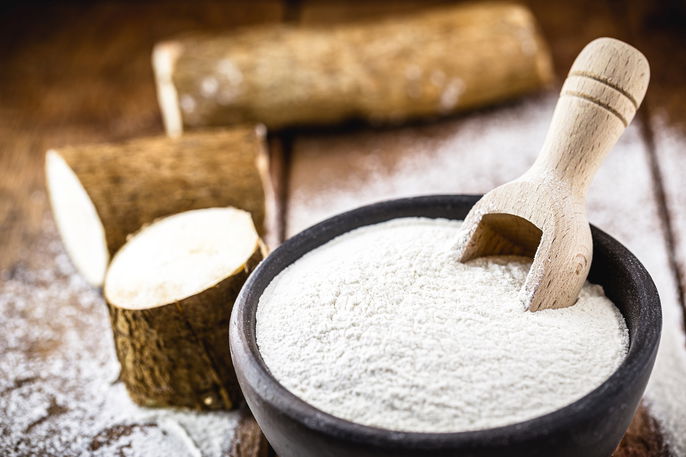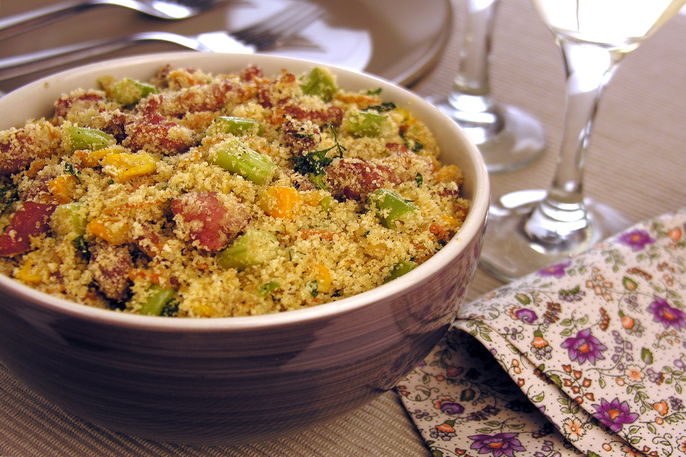Cassava flour is a great source of minerals and it is high in fiber. It can help to regulate blood glucose levels and prolong satiety throughout the day, which can help contribute to weight loss and ward off diabetes.
However, cassava flour should be consumed in moderation as it is high in carbohydrates that can lead to weight gain, especially when prepared with other high-fight foods, like bacon or fried foods.
Cassava flour has a mild flavor and can be eaten raw or roasted to accompany meals. It can also be used to prepare recipes like farofa, cake, porridge, bread and cookies.

Health benefits
The main health benefits of cassava flour are:
- Improving physical and mental disposition, as it is rich in carbohydrates;
- Preventing constipation, as it is rich in fiber which stimulates bowel movements
- Preventing cramps, as it has a great source of potassium;
- Helping to prevent diabetes, because it has a low glycemic index, which can help to regulate blood glucose levels;
- Promoting weight loss, because it is rich in fiber which can keep you full throughout the day
- Helping to prevent high blood pressure, due to its magnesium and potassium content.
Furthermore, cassava flour does not contain gluten, making it a great option for those with a gluten intolerance or sensitivity. Check-out other gluten-free foods that you can consume along with cassava flour.
Does cassava flour cause weight gain?
When consumed in large quantities, cassava flour can lead to weight gain, as it is high in carbohydrates and calories.
Furthermore, when prepared with ther high-fat foods, like bacon or fried foods, cassava flour can make you gain weight.
However, cassava flour has a low glycemic index, which can contribute to blood glucose regulation and reduce appetite. Therefore, when it is consumed in moderation and added to healthy recipes, cassava flour can be added to a weight loss diet.
How to eat cassava flour without gaining weight
To enjoy the flavor and health benefits of cassava flour without gaining weight, you can eat 1 to 2 tablespoons of this flour per day. It can be used in preparations such as salads, pancakes, omelets, bread, porridge and soup.
It is also recommended to consume cassava flour along with a protein source (such as chicken, fish and eggs) and vegetables, as these foods help to reduce the glycemic load of the meal, promoting satiety and preventing weight gain.
Nutritional information
The following table outlines the nutritional information in 100 g of raw and roasted cassava flour:
To obtain the all the health benefits and nutrients that cassava flour has to offer, it is also essential to maintain a healthy diet and to exercise regularly.
Cassava flour recipes

Cassava flour can be added to healthy and tasty recipes, such as vegetable farofa and cakes.
1. Vegetable farofa
Ingredients:
- 2 medium grated carrots
- 2 small grated zucchinis
- 1 tablespoon of unsalted butter
- 1 medium grated onion
- 3 chopped garlic cloves
- 2 cups of cassava flour
- Chopped parsley to taste
- Salt and ground pepper to taste
Directions:
In a frying pan, toast the cassava flour well over medium heat and set aside. In another frying pan, heat the butter, add the onion and chopped garlic, and sauté well.
Add the grated zucchini and carrot and sauté, stirring with a spoon, for 5 minutes. Add the toasted flour, salt and seasonings, mixing well until the farofa is very homogeneous. Wait for it to cool and serve.
2. Cassava flour cake
Ingredients:
- 1 cup of brown sugar or 1 teaspoon of sweetener
- 100 g of unsalted butter
- 4 egg yolks
- 1 cup of coconut milk
- 2 and 1/2 cups of sifted raw cassava flour
- 1 pinch of salt
- 4 egg whites beaten to stiff peaks
- 1 tablespoon of chemical baking powder
Directions:
Beat the sugar, or sweetener, butter and egg yolks until creamy. Add the coconut milk, salt and flour to the mixture, beating little by little.
Lastly, add the yeast and egg whites, stirring gently with a spoon until the dough is homogenized. Pour the dough into a greased pan and place in a preheated oven at 180 ºC (or 350 ºF) for around 40 minutes.






























